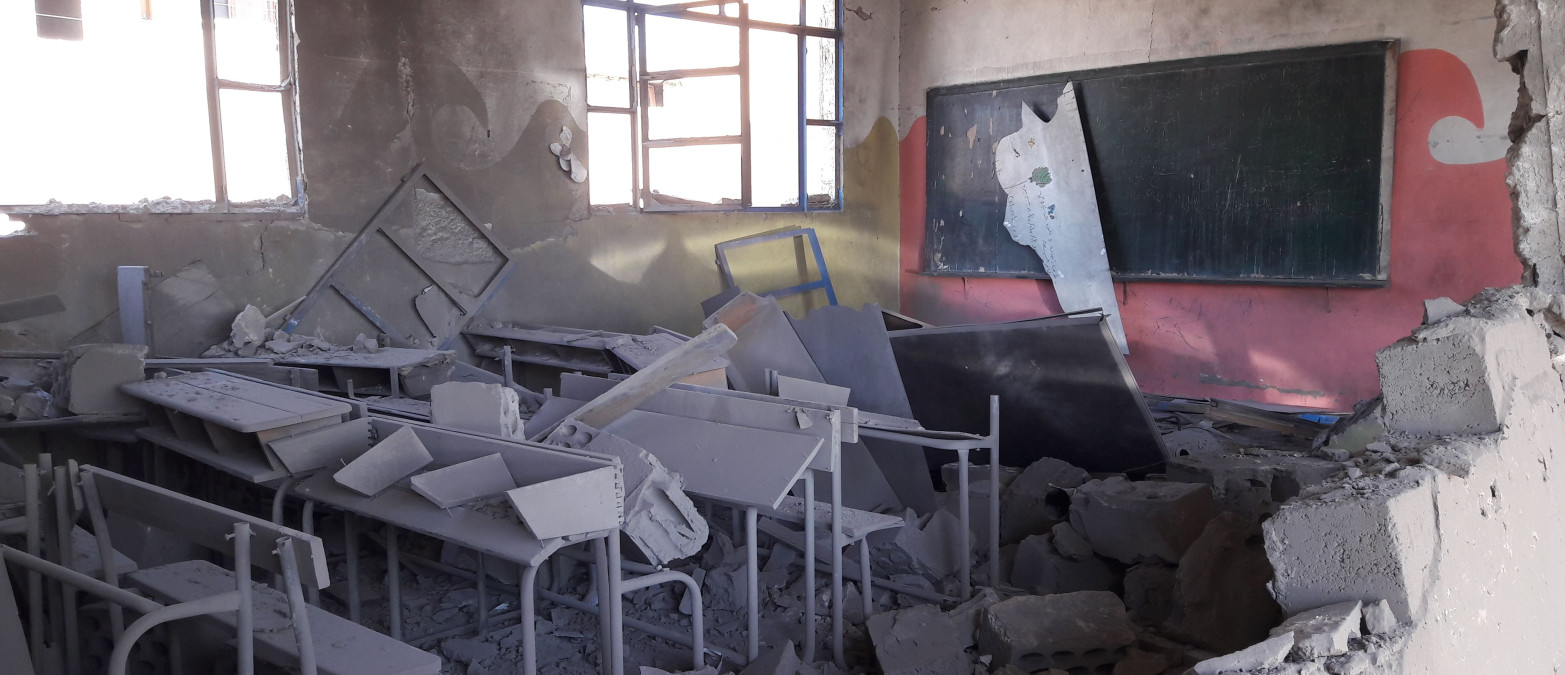Despite the bombs, a hunger for education in Syria persists
Published: Mar 26, 2019 Reading time: 4 minutes Share: Share an articleSchools have always been important symbols of hope. Even in the midst of violent conflict, they are meant to be places of safety, doorways held open to a better future. Perhaps this is why a bombed-out school is such a shocking sight: the blackboards broken, books scattered, child-sized tables and chairs buried under rubble.

Unfortunately, this has become an all-too-common sight in northern Syria. Only two weeks ago, on the 12th March, a school People in Need supports in Idlib was hit by a mortar shell. The bomb blew a hole clear through a wall of one of the classrooms, where only hours before students had been sitting at their lessons.
In any other part of the world, this would be a major incident. For Principal Ali and his 728 students, it was only a minor disruption.
“School was closed for one day,” he told us. “Over the weekend, we repaired the damaged parts of the two classrooms.”
This was the aftermath of just one of countless shelling incidents and 24 airstrikes to hit Idlib in the last month, in the most worrying escalation of violence since Turkey and Russia agreed to a tentative ceasefire last year. Luckily, this school was empty at the time of the bombing. But it joins a list of others which were not. In the last year alone, more than 60 schools in Syria were attacked, according to UNICEF. This is what a generation of children have grown up knowing. Each time a school is struck, we hope it will be the last. Each time, it is not. Over the course of eight years of a war that has killed an estimated half a million people and razed whole cities to the ground, one in every three schools in Syria have been rendered unusable.
“Our school was hit more than once since the beginning of the conflict, with rockets and mortar shelling,” Principal Ali told us. “It was closed many times.”
His school is one of two in southern Idlib which have been bombed already this year, despite being far from the frontline. “Actually we cannot predict when or where the next school will be hit,” explained Hasan Khatoub, PIN’s education assistant in the area.
In these circumstances, it is difficult to encourage children to continue their education. If the bombs continue, then the simple act of going to school is life-threatening.
But the feeling on the ground is different. In 2017, after an airstrike on another school PIN worked with, the first thing teachers and parents did when the skies cleared was run out and rescue salvageable furniture to re-create the school again elsewhere. That same day and the following night, bombs continued to drop around them. But education took priority. The risk of a “lost generation” is too great.
A similar response is clear in this latest attack. “Both teachers and students had the will and insistence to continue coming to school,” explained Hasan. “In fact, they are even more motivated to overcome all the challenges facing their learning. I would not say this shelling is normal for the children and parents, but it has become almost a part and parcel of people’s daily routine across Idlib.”
This hunger to learn is something we hear again and again from the people we work with. And it is why we continue to work day in and day out – with children and teachers, support staff and parents – to help keep schools open in northern Syria.
Principal Ali’s school has been receiving support from People In Need since February 2018. It is one of 29 schools we currently assist in Syria through a holistic package that includes support for the maintenance and rehabilitation of schools, specialized training, teacher kits, fuel for heating, drinking water, and support to education staff. We also provide schoolbags and stationary for students, and furniture such as desks, tables and whiteboards. Psychosocial support facilitators are also funded at this school and others, to help students solve problems and build self-confidence, and emergency response preparedness plans are provided for all the schools we support.
“Before this, most teachers were working voluntarily,” Principal Ali told us. "After the support, there was huge change as the school was rehabilitated completely. Everything was going perfectly until it was hit few days ago.”
Principal Ali’s own child was injured in the chest by another shell that night, which struck close to his home. “We took him to the hospital and thank God he is improving quickly.” In the face of what they have witnessed, the hope that educators like Ali nurture is small. “Things will be better again, God willing. I hope there will be no escalation in the next few days.”
In the meantime, he and his staff continue to teach.
In addition to other forms of humanitarian assistance, PIN is currently supporting 28 schools and 36 school shifts across Syria, reaching more than 13,000 students and over 600 qualified teachers and PSS facilitators. This work is supported by the European Neighbourhood Instrument (ENI), the Swiss government, and UK aid from the UK government.
*The names of all those individuals living within northern Syria have been changed for protection purposes.



